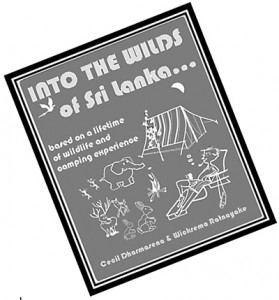A record of a lifetime of camping
View(s):Written by two inveterate jungle men, ‘Into the Wilds of Sri Lanka’ is an excellent guide to those going to camp or stay in the jungles. The two authors are both very experienced and regular visitors to the wilderness areas round the country. They have camped in almost all the landscapes in the country. This is an exercise that they started many many years ago and they still continue to go camping. Their experience is reflected throughout the book.
 Cecil Dharmasena and Wickrema Ratnayake are both former officers of the Department of Agriculture. I know them both well and their love for the jungles. Cecil worked with me in the Accelerated Mahaweli Project and Wickrema was my neighbour at the Agriculture Research Station at Maha Illupallama. This is an unbeatable jungle camping duo.
Cecil Dharmasena and Wickrema Ratnayake are both former officers of the Department of Agriculture. I know them both well and their love for the jungles. Cecil worked with me in the Accelerated Mahaweli Project and Wickrema was my neighbour at the Agriculture Research Station at Maha Illupallama. This is an unbeatable jungle camping duo.
The tendency of most of those who go to the jungles is to drive through noting the number of elephants, leopards and bear that are seen. Some, who are not avid bird watchers, note the presence of some familiar species as well. The information that is collected thus is disseminated to their town-bound friends at parties, clubs, weddings etc. Then much is forgotten till the next trip. Of course there are many genuine lovers of the wilds who make efforts to ensure the continuance of these species.
Camping in the jungles instead of staying in hotels and guest houses, gives one a more complete wildlife and environmental experience. When camping you are continuously in the jungle. You can see, hear and encounter much more that the denizens of the jungle have to offer. The experience is more complete because not only the large and more evident species, mentioned above, but the small insects, nocturnal species etc. are encountered. This makes it much more satisfying to the wildlife lover.
As the authors say “Sitting under a tree by a jungle river, listening to the calls of birds and the sound of rippling water cascading over small rocks and pebbles, watching a butterfly flitting from a flower to a pile of elephant dung on the sand, or a dragon fly on a dead stick in a stagnant pool by the river bank, one can get into a transcendental state of thought.”
In chapter 1, the authors detail the benefits you get from a camping trip to the wilds. In chapters two and three they reminisce about their experiences from and incidents that occurred during their many camping trips. Chapter four deals with the important dynamics of a camping group – a group leader, ideal number five persons. The group leader should have some experience in managing people. This experience is necessary since latent fears, suspicions, nervousness, abnormal reactions etc. can surface when ‘Green horns’ are subject to a night in the wild. When completely out of their comfort zone their fears and concerns can become a source of irritation, at best, to the rest of the group. This is when the skills and experience of the group leader comes into play. Decisions have to be taken as to the ideal time of the year to go camping in response to fluctuating and adverse weather conditions.
Vehicles to be taken, together with the necessary accessories, have to be decided on. What the optimum camping equipment is, including beds, tables, pots and pans, kitchen utensils, have to be decided on. One has to decide on what foodstuffs and in what quantities they have to be taken. Food consumed differs due to religious biases and health concerns of individuals in the group.
One chapter discusses the dangers of camping out. Another details the wildlife reserves and the camping facilities they offer. This is a book that is a must for all those who visit our wilderness areas and not only for those who go out camping. Here is a record of a lifetime of camping in the wilderness areas of the duo Cecil and Wickrema. I would like to congratulate them on this book which is both a guide to camping and a record of practical wildlife experiences.
Book facts
Into the Wilds of Sri Lanka
By Cecil Dharmasena and Wickrema Ratnayake
Reviewed by Jayantha Jayewardene
Into the Wilds of Sri Lanka
By Cecil Dharmasena and Wickrema Ratnayake
Reviewed by Jayantha Jayewardene


